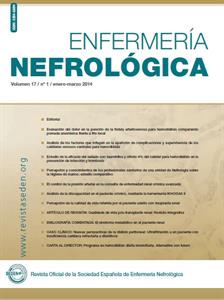Contenido del artículo principal
Resumen
Un conocimiento adecuado sobre la higiene de las manos por parte de los profesionales sanitarios, es el primer paso para la adherencia a cualquier programa de disminución de infección relacionada con la asistencia sanitaria.
Objetivo
Evaluar el nivel de conocimientos y percepciones respecto a la higiene de manos entre los profesionales sanitarios de nuestra unidad de Nefrología, y compararlos con los de otra unidad de nuestro centro (Traumatología).
Material y método
Estudio prospectivo descriptivo comparativo en 69 profesionales sanitarios. Para evaluar los conocimientos y percepciones respecto a la higiene de manos se utilizó un cuestionario de 26 ítems basado en cuestionarios desarrollados por la Organización Mundial de la Salud.
Resultados
73% utiliza regularmente preparados de base alcohólica para higiene de manos (Traumatología 96,9%, p=0,007). 94% piensa que las manos de los profesionales sanitarios cuando no están limpias son la principal
vía de transmisión de gérmenes patógenos (Traumatología: 87,1%, p=NS). 75,7% piensan que el entorno/
superfi cies del hospital es la principal fuente de gérmenes patógenos (Traumatología: 68,8%) y 16% que son los microrganismos ya presentes en el paciente (Traumatología: 25%) (p=NS). Percepciones: 89% consideran alta la repercusión de las infecciones relacionadas con la asistencia sanitaria en el desenlace de la enfermedad (Traumatología: 59,4%, p=0,009).
Respecto a las medidas más efectivas para mejorar la higiene de manos destacan la formación de los profesionales
sanitarios, recibir retroalimentación regularmente sobre cómo realizar la higiene de manos y que exista un preparado de base alcohólica en cada punto de atención.
Conclusiones
Los profesionales sanitarios de Nefrología, al igual que los de Traumatología, en general tienen conocimientos
y percepciones adecuados sobre la higiene de manos.
Objetivo
Evaluar el nivel de conocimientos y percepciones respecto a la higiene de manos entre los profesionales sanitarios de nuestra unidad de Nefrología, y compararlos con los de otra unidad de nuestro centro (Traumatología).
Material y método
Estudio prospectivo descriptivo comparativo en 69 profesionales sanitarios. Para evaluar los conocimientos y percepciones respecto a la higiene de manos se utilizó un cuestionario de 26 ítems basado en cuestionarios desarrollados por la Organización Mundial de la Salud.
Resultados
73% utiliza regularmente preparados de base alcohólica para higiene de manos (Traumatología 96,9%, p=0,007). 94% piensa que las manos de los profesionales sanitarios cuando no están limpias son la principal
vía de transmisión de gérmenes patógenos (Traumatología: 87,1%, p=NS). 75,7% piensan que el entorno/
superfi cies del hospital es la principal fuente de gérmenes patógenos (Traumatología: 68,8%) y 16% que son los microrganismos ya presentes en el paciente (Traumatología: 25%) (p=NS). Percepciones: 89% consideran alta la repercusión de las infecciones relacionadas con la asistencia sanitaria en el desenlace de la enfermedad (Traumatología: 59,4%, p=0,009).
Respecto a las medidas más efectivas para mejorar la higiene de manos destacan la formación de los profesionales
sanitarios, recibir retroalimentación regularmente sobre cómo realizar la higiene de manos y que exista un preparado de base alcohólica en cada punto de atención.
Conclusiones
Los profesionales sanitarios de Nefrología, al igual que los de Traumatología, en general tienen conocimientos
y percepciones adecuados sobre la higiene de manos.
Palabras clave
higiene de las manos; profesional sanitario; conocimientos; actitudes y práctica en salud; diálisis renal; traumatología.
Detalles del artículo
Licencia
Aviso de derechos de autor/a
© Los autores ceden de forma no exclusiva los derechos de explotación de los trabajos publicados y consiente en que su uso y distribución se realice con la Licencia Creative Commons Atribución - No comercial 4.0 Internacional (CC BY-NC 4.0). Puede consultar desde aquí la versión informativa y el texto legal de la licencia. Esta circunstancia ha de hacerse constar expresamente de esta forma cuando sea necesario.
Cómo citar
1.
Cobo Sánchez JL, Pelayo Alonso R, Menezo Viadero R, Incera Setién ME, Gándara Revuelta M, López López LM. Percepción y conocimientos de los profesionales sanitarios de una unidad de Nefrología sobre la higiene de manos: estudio comparativo. Enferm Nefrol [Internet]. 2014 [consultado 7 Feb 2026];17(1):[aprox. 7 p.]. Disponible en: https://www.enfermerianefrologica.com/revista/article/view/4229




